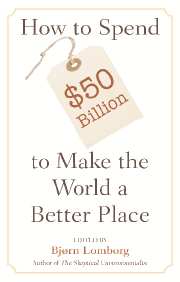Book contents
- Frontmatter
- Contents
- Contributors
- Introduction
- 1 Meeting the Challenge of Global Warming
- CLIMATE CHANGE – OPPONENTS' VIEWS
- 2 Communicable Diseases
- COMMUNICABLE DISEASES – OPPONENTS' VIEWS
- 3 The Challenge of Reducing the Global Incidence of Civil War
- THE CHALLENGE OF CONFLICTS – OPPONENTS' VIEWS
- 4 Toward a New Consensus for Addressing the Global Challenge of the Lack of Education
- THE CHALLENGE OF LACK OF EDUCATION – OPPONENTS' VIEWS
- 5 The Challenge of Poor Governance and Corruption
- THE CHALLENGE OF POOR GOVERNANCE AND CORRUPTION – OPPONENTS' VIEWS
- 6 Hunger and Malnutrition
- HUNGER AND MALNUTRITION – OPPONENTS' VIEWS
- 7 Population and Migration
- POPULATION: MIGRATION – OPPONENTS' VIEWS
- 8 The Water Challenge
- THE WATER CHALLENGE – OPPONENTS' VIEWS
- 9 Subsidies and Trade Barriers
- SUBSIDIES AND TRADE BARRIERS – OPPONENTS' VIEWS
- Expert Panel Ranking
- Index
8 - The Water Challenge
Published online by Cambridge University Press: 27 July 2009
- Frontmatter
- Contents
- Contributors
- Introduction
- 1 Meeting the Challenge of Global Warming
- CLIMATE CHANGE – OPPONENTS' VIEWS
- 2 Communicable Diseases
- COMMUNICABLE DISEASES – OPPONENTS' VIEWS
- 3 The Challenge of Reducing the Global Incidence of Civil War
- THE CHALLENGE OF CONFLICTS – OPPONENTS' VIEWS
- 4 Toward a New Consensus for Addressing the Global Challenge of the Lack of Education
- THE CHALLENGE OF LACK OF EDUCATION – OPPONENTS' VIEWS
- 5 The Challenge of Poor Governance and Corruption
- THE CHALLENGE OF POOR GOVERNANCE AND CORRUPTION – OPPONENTS' VIEWS
- 6 Hunger and Malnutrition
- HUNGER AND MALNUTRITION – OPPONENTS' VIEWS
- 7 Population and Migration
- POPULATION: MIGRATION – OPPONENTS' VIEWS
- 8 The Water Challenge
- THE WATER CHALLENGE – OPPONENTS' VIEWS
- 9 Subsidies and Trade Barriers
- SUBSIDIES AND TRADE BARRIERS – OPPONENTS' VIEWS
- Expert Panel Ranking
- Index
Summary
Characteristics of the water challenge
Despite the massive investment in water resource development during the twentieth century – in recent decades also reaching the developing world – there is still what many see as a “water crisis.” This has two key facets:
Lack of access to safe and affordable domestic water supply (for over a billion people) and sanitation (for nearly half the world's population).
Lack of access to water for productive purposes for the rural poor.
There is clearly sufficient water available in the world for all mankind's needs: domestic, industrial, and agricultural, although it is distributed very unevenly. The problem is not lack of water, but that the unserved do not have access to capital (financial or political) to make it available to them. The challenge addressed here is, therefore, providing access for poor people to safe water for domestic and productive purposes.
Domestic water needs are relatively small; only 20–50 litres per head each day in developing countries (although up to ten times this in the USA and Europe). In contrast, each person needs thousands of litres a day to produce their food. About 1,000 litres (one cubic metre) of water are needed to produce one kilogram of cereal grain, and meat production requires considerably higher quantities. On average, each person needs seventy times as much water to feed them as for all domestic purposes.
Water resources are subject to competition for different uses, particularly agriculture and the environment.
- Type
- Chapter
- Information
- How to Spend $50 Billion to Make the World a Better Place , pp. 129 - 140Publisher: Cambridge University PressPrint publication year: 2006

